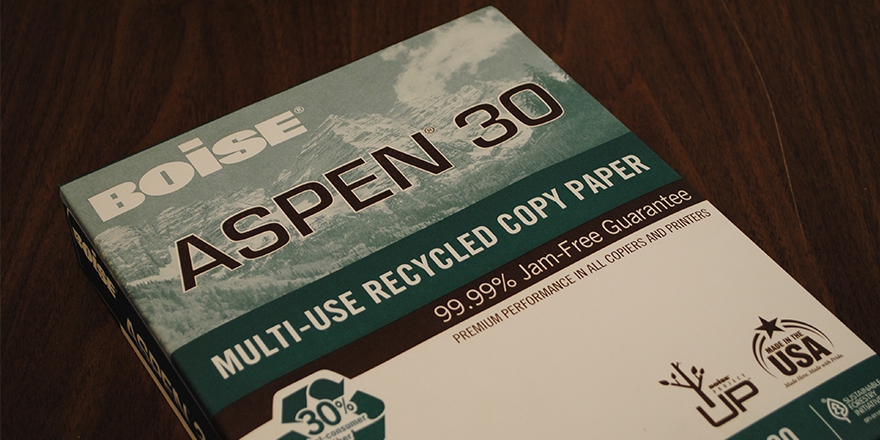
Green Strides – Changing purchasing practices at CSM
It may not be flashy. It may not be high profile. But, the way in which College of Saint Mary faculty and staff go about buying everything from paper clips to office appliances contributes to lowering the College’s carbon foot print – in a big way.
Sustainability can be defined as creating and maintaining conditions under which humans and nature can exist in productive harmony that permit fulfilling social and economic requirements. “Sustainable Purchasing (SP),” says Kim Savicky, chief administration officer for CSM, “supports CSM’s commitment to sustainability.”
Buying green is mindfully purchasing only those products which are absolutely necessary, with a preference towards those that contain at least some recycled materials, and are not considered ‘disposable’. Deliberate thought is given to cost, quantity and quality. Spending less on purchases opens up funds which can be applied strategically in other areas of need.
In 2014, CSM was one of five universities which took part in the U.S. Environmental Protection Agency-funded research, conducted by Nebraska Business Development Center. Part of the study revealed the tremendous savings – both monetary and environmental – that resulted from CSM’s sustainable buying methods.
‘Buying green’ during the 2014-2015 fiscal year helped save 15 tons of wood, eliminated 7.81 metric tons of greenhouse emission, saved 98 million BTUs of energy, and reduced water use by 73,737 gallons of water. It also eliminated 5,947 pounds of solid waste that would otherwise have ended up in landfills, reducing greenhouse gas emissions. All of these steps help reduce CSM’s carbon footprint and protect the environment, which is one of the five Critical Concerns identified by the Sisters of Mercy.
Creating a Green Culture
This type of deliberate buying eventually results in a green culture, in which mindfulness is present in everyday actions, like buying paper for the copy machines and turning off lights when temperatures exceed 92 degrees. When it becomes a cultural norm, SP isn’t a conscious act – it’s done without thought because ‘that’s just the way it’s done’. At CSM, that green culture is already in place.
The 2014 study also looked at the perceptions, attitudes and behaviors of staff members who are responsible for purchasing office supplies. The results revealed that sustainable leadership at CSM is very strong. It was the only institution in the study at which sustainable products are brought up in the purchasing process, as well as the only institute at which the staff reported that there was a committee assigned to handle sustainability tasks.
“The most impressive result of the study,” says Savicky, “was the staff’s embrace of sustainable products, their unique willingness to ‘buy green’ and learn more about SP.” Unlike the other universities in the research, all of the CSM staff involved in the research reported that they were engaged in sustainable purchasing, and wanted to know how to do it even better.
The report further concluded that “the results clearly show that people are willing and interested in sustainability and environmentally preferable purchasing and that (the College) is promoting SP.” All of which contributes to the bottom ‘green’ line.











